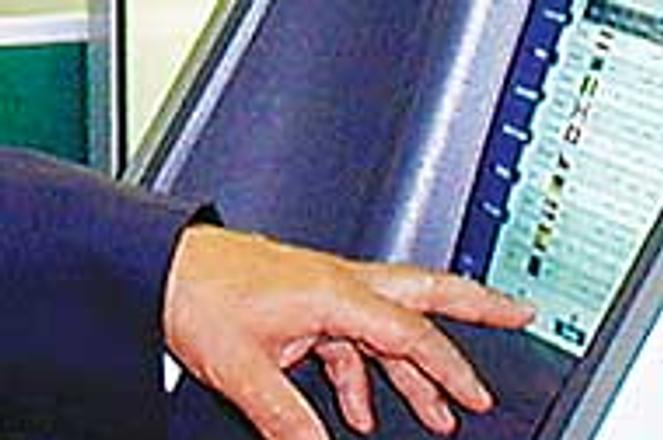HOW much is that in euro?photo: TASR
SLOVAKS expect their living standards to drop steeply after September parliamentary elections, though they remain upbeat about the prospects of European Union (EU) membership, according to a recent poll.
The poll, conducted by the Dicio agency at the beginning of May, found that nearly a third of respondents believed their salaries would increase after Slovakia receives EU membership, which may come as soon as 2004. An equal number foresaw a drop in the nation's almost 20 per cent unemployment rate.
On the other hand, only 7.4 per cent and 8.3 per cent, respectively, believed the same improvements would occur after parliamentary elections scheduled for September 20-21 (see chart at right).
A majority of respondents also believed that prices would increase and their purchasing power fall both after elections and following EU entry.
Independent analysts and the Dicio officials who carried out the poll said that the figures reflected general frustration about the inability of Slovak politicians to secure lasting improvements in living standards.
Real wages fell about seven per cent in the first three years following the Dzurinda government's accession to power in late 1998.
The analysts noted, however, that Slovaks seemed to be hoping that EU membership would achieve what domestic governments seemed incapable of performing.
"People expect stabilisation to come after EU membership because they have seen all kinds of governments in power, but in their view not much has improved. They are hoping for something new," said Júlia Sobinovská of the Dicio agency.
Ľudovít Ódor, an analyst with the Slovak rating agency, said the respondents' lack of hope for improvement after September elections corresponded with the low degree of public trust in the government and parliament as institutions.
According to research conducted in March, only 13.8 per cent of the population trusts the parliament and 18.7 per cent the government, making these among the least respected institutions in the country.
Based on the results of a study prepared by the Slovak Academy of Sciences (SAV), government officials have recently warned that Slovakia's entry to the EU could bring a significant increase in prices of 15 to 16 per cent and an unemployment rate as high as 30 per cent.
But analysts say the figures are exaggerated, and that Slovaks can in fact expect only a moderate impact on their wallets from EU entry, one that will give way to a gradual improvement in their living standards.
"We expect prices to increase by over four per cent and the unemployment rate to decrease, due to the anticipated inflow of foreign investment after Slovakia enters the EU," said Ján Tóth, senior economist with ING Barings bank.
Tóth also explained that after further deregulation brings prices into line with market levels, which the Finance Ministry expects will boost inflation to seven per cent in 2003, the drastic increase in prices that the SAV expects won't occur.
"Prices for groceries are already not so cheap in Slovakia, as many of them are imported from abroad, so they are not likely to rise further after EU entry. Indeed, the expansion of [mainly European] hypermarkets in Slovakia has dropped grocery prices by about nine per cent since 1999," Tóth said.
"However, prices for services will gradually grow as living standards increase with more foreign investments coming to Slovakia and less unemployment, which will be reflected in higher real wages."
"So no, we do not expect any catastrophic scenarios," Tóth added.
However, many still expect the worst before any improvement.
Andrej Palinský, a 25-year-old customs officer from western Slovakia's Nitra, said he expected the economic situation to worsen after September elections.
"The first year after elections will be difficult, but after joining the EU, my financial situation for example will improve as the salaries of customs officers are likely to grow, so I definitely expect more from EU membership than from this year's elections," he said.
Milan Gonda, a 66-year-old member of a security service in Bratislava, said that for the cool analyses of economists to become reality, the EU had to perceive Slovakia as an equal partner.
"This is the basic condition for success, and I hope it will happen," he said.


